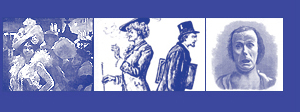Biographies
Henry Maudsley (1835-1918)
Henry Maudsley (1835-1918), perhaps the leading British psychiatrist of his day, was born in Yorkshire in 1835. His Dissenting background led him to study at University College, London, and he graduated MD in 1855, hoping to become a medical officer with the East India Company. This was a position that required a six-month residency at a county lunatic asylum, and he easily secured a post at the West Riding Asylum in Wakefield . To his surprise, he proved to be a successful Assistant Medical Officer . Instead of moving abroad, the next four years were spent working in a number of county asylums. In 1859 he was appointed Superintendent of Manchester Royal Lunatic Asylum, Cheadle, a post he held until 1862 when he returned to London. It was in the capital that Maudsley cemented his professional reputation. He was a prolific writer, and he was extraordinarily well read in the medico-psychological literature of Britain, France and Germany. In the early 1860s, he became active in the affairs of the Association of Medical Officers of Asylums and Hospitals. Maudsley was clearly a sharp political operator, and in 1863 his hard work paid off: He was awarded the co-editorship of the pre-eminent psychological journal, The Journal of Mental Science. In 1864 Maudsley became the Junior Physician at the West London Hospital, and two years later, the Senior Physician there. Around this time, he also became a regular visitor at the home and private asylum (Hanwell) of the famed asylum reformer, John Conolly. In 1866, he married his daughter, Ann Conolly.
Conolly welcomed Maudsley into his inner circle. He even bequeathed him the licence to his private asylum, ‘The Lawn’ at Hanwell, upon his death in 1866. The same year, Maudsley was elected Fellow of the Royal College of Physicians. He also became a Fellow of UCL in the 1860s. In 1867 Maudsley ensured his international reputation by acting as consultant to the Hapsburg Archduchess Charlotta, Empress of Mexico. From 1867 until 1881 he lectured in Insanity at St Mary’s Hospital. Sometime in the early 1870s he became Chair of Medical Jurisprudence at UCL.
Despite the familial and professional ties that bound Maudsley and Conolly together, they were very different – both in temperament and in their attitude towards the care and treatment of the insane. Conolly was widely regarded as a genial and openhearted. He was an optimist whose outlook on life permeated his pioneering work with moral therapy. In contrast, Maudsley was a dour, serious man. He was scathing in his attitude towards moral therapy and soon came to openly doubt the benefits of institutional care. Both positions put him in conflict with many of his colleagues in the world of mental science.
Part of the problem lay in Maudsley’s steadfast and uncompromising belief in the physiological and pathological nature of insanity. To him, heredity and inheritance were keys to understanding the disease. Maudsley was a pessimist. Lunatics were simply by-products of evolution, not fit for treatment. Not even education could alter the inevitable process of decay and degeneration. In the latter part of his career Maudsley had no contact with asylum life. He was openly critical of the ‘medical’ role played by asylum superintendents. He was hostile to what he perceived as flawed systems of therapeutic treatment in lunatic asylums, and critical of the chemical sedatives administered in asylums. Asylums themselves, he argued, could further damage rather than cure their patients. By the summer of 1878, he had resigned his editorship of the Journal of Mental Science amidst intense and (finally) open criticism of his Presidential Address to the Medico-Psychological Association in August 1871. In ‘Insanity and Its Treatment’ Maudsley launched a wide-ranging attack on his own profession of psychiatry, ridiculing as groundless its pretensions to cure the insane. He was almost universally condemned, his colleagues forming ranks to re-emphasise the usefulness of moral therapy in both treating and preventing insanity. His increasing pessimism in the face of cases of recalcitrant insanity, and what he saw as the degeneration of the race, set him apart from most of his colleagues, and contributed to his later isolation. In 1879 he retreated from public life. By the 1880s, he rarely even attended Association meetings, and by the 1890s, his name had been taken off the member list. Though he continued to write prolifically, reaching a wide audience , Maudsley was reclusive in his later years, t hough he continued to consult at the private Ticehurst Asylum, and care for its wealthy, aristocratic patients.
In 1915 he gifted 30,000 pounds for a psychiatric hospital to be established, and he is perhaps best known today as the benefactor of the Maudsley Hospital in London. Today it remains part of the South London and Maudsley NHS Trust . He died in the last year of the Great War. His other major works include: Insanity and Crime (1864); On the Method of the Study of the Mind (1865); The Physiology and Pathology of Mind (1867; 2 nd edition, 1868; German and Italian translations, 1870; revised as The Physiology of Mind, 1876 and The Pathology of Mind, 1879; 2 nd edition, 1895); Responsibility in Mental Disease (1874); Body and Will (1883); Natural Causes and Supernatural Seemings (1886); Life in Mind and Conduct (1902); Heredity, Variation and Genius (1908); Organic to Human (1916); Religion and Realities (1918).

